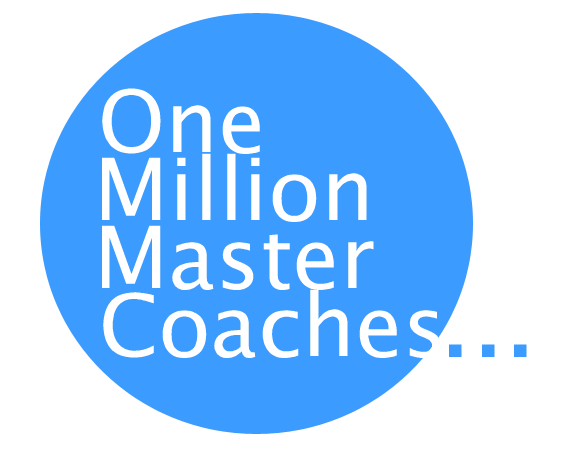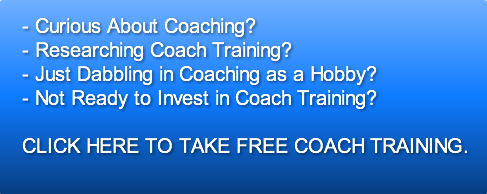 If you're a business of life coach, or any type of solo professional, then attracting coaching clients via social networking sites can be incredibly valuable.
If you're a business of life coach, or any type of solo professional, then attracting coaching clients via social networking sites can be incredibly valuable.
If you're new to social networking and social media marketing, it can be pretty overwhelming. The great news is that you only need some essentials to get started. From there, it's pretty easy 'to learn as you go'.
The first step of course, is to join and build a following on social networking sites. From there, if you know how to do it, you can easily attracting paid coaching clients. I share two brief stories about how two coaches filled their coaching practices quickly with clients by leveraging their social networking relationships with Coach 100 in the new eBook, The Essential Guide to Social Media Marketing for Solo Professionals. To Get the free eBook, click the big button below. To learn more about how to attract coaching clients via social networking and many other approaches, join Coach 100. More info below. But first, here's one section from the new eBook.
How to Build Your Following on Social Sites
- Start by following others. Makes sense, doesn’t it? People like to connect and they’ll be more likely to connect with you, if you make the first move. Don’t be shy. This is a lot easier than asking somebody to dance at a high-school mixer. But here’s where it gets similar to school: the more popular you are, the more people will want to connect to you. Get the ball rolling and eventually momentum will start to help you out.
- Consistently Add Fresh Content to Your Social Profiles. Social networking doesn’t have to take more than a few minutes per day, but do be consistent. Try setting aside ten minutes per day to share something relevant. An easy way to do this is to share great blog posts from blog sites that are related to your specialty. Most blogs today have social sharing buttons built right into the interface (see ours above). You can amplify your shares across numerous social sites by taking advantage of their sharing options. LinkedIn has this built into posts. Just click a box to share something from LinkedIn to Twitter, for example.
- Self-Promote Minimally. Even on sites where self-promotion is well tolerated, such as Twitter, the rule of thumb is to post something promotional once out of every seven tweets. Exceptions are made for commercial accounts, such as Starbucks or Amazon, that people follow specifically to receive discount offers. If you’re running a high-end solo business, such as coaching, you want to primarily engage in conversations and add useful content, with an occasional offer to buy your book, attend your seminar, or try a sample session. Be even more judicious on Facebook, which is primarily social, unless you have a (free) Facebook Page for your business.
- Be Somebody People Want to Follow. That’s one reason why a head shot of you is so important to your social profile. People generally follow people, not companies. Let your personality come across. Are you philosophical? Share deep thoughts and/or quote other famous people (and share the thoughts of people you follow – which is a great way to get them to follow you back). Love humor? Make an occasional wisecrack or share the jokes of famous comedians you follow. Care about social issues? Update your accounts with links to important online petitions. All of this pays off when your clients like what you like. The better you know your market, the more you can hone your voice.
- Be conversational. Reply to people who message you. Retweet or share their comments. Join in the conversation. This can be as simple as ‘liking’ what somebody says on Facebook or as involved as participating in a lively conversation in a group on LinkedIn.
- Focus on the social networks that matter most to your clients. You can’t be everywhere, even on the internet. If you have a business-to-consumer service (as opposed to business-to-business), then LinkedIn may not be ideal for you. If your clientele are older, then maybe the latest hot new social site (currently, that’s Pinterest) isn’t important yet for your business.
- Invite your website visitors to join you online. Add ‘Follow Me’ buttons (you can get them free from Twitter, for instance, or Google to find 3rd-party buttons) to every page on your site (See our 'Follow Us' buttons to the right). This encourages your visitors to talk about you in a potentially viral venue. Likewise, be sure to add social sharing buttons to all of your blog posts (if you have one – recommended). All the major forms of blogging software (like Wordpress) have them available. Finally, you can add social conversations to your website by adding social streams from Facebook, Twitter, etc. (scroll down to the right to see one of ours) The more ways people can find you and talk about you online, the more people will find you and talk about you online. Trigger the viral nature of social networking and your customers will market for you!
To get indepth instructions on how to build your coaching business with social media, along with many other approaches, join Coach 100. There are three levels to choose from, depending on your experience and how much you want to spend. Each one provides a proven system for attracting paying coaching clients and filling your business.





 Want to know
Want to know 
 Once upon a time, in a land far far away, where everything always looked as it should, if you hired a
Once upon a time, in a land far far away, where everything always looked as it should, if you hired a 
 The
The 



 Have you ever wished you could get insider tips on how to succeed at something?
Have you ever wished you could get insider tips on how to succeed at something? 





